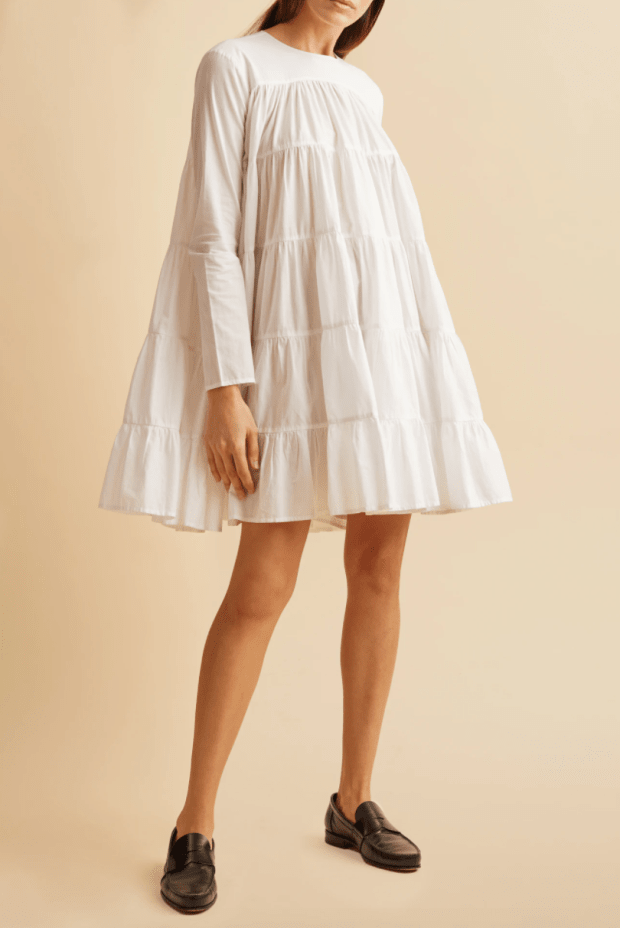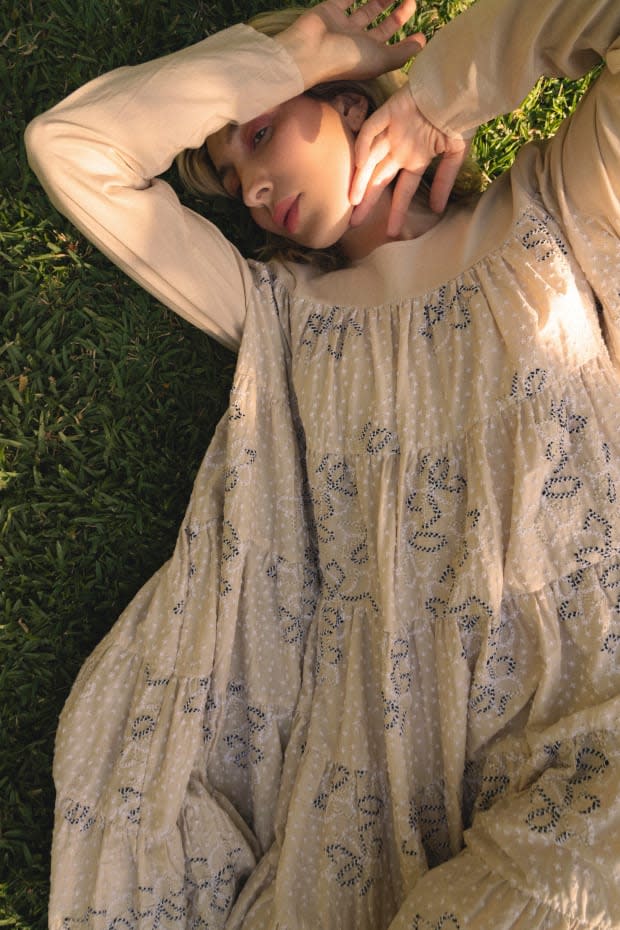Merlette Is Redefining Luxury With Its Seasonless, Loose-Fitting Dresses
As the brand celebrates its five-year anniversary, it's showing no signs of slowing down.
For years, fashion worked to keep the threads of its fantasy intact. Covid-19, however, unraveled it beyond repair. The economic fallout of the pandemic laid bare so many of the issues in these whimsical designer garments, their aspirational extravagance poked fun at by sweatpants-wearing and nap dress-appreciating realists.
Merlette, the Brooklyn-based label launched by Australian designer Marina Cortbawi in 2016, has become beloved for peddling the type of clothing people suddenly couldn't get enough of: seasonless, loose-fitting, lightweight cotton dresses. Sold at several major retailers, its throw-on-and-go designs and soft-to-the-touch, machine washable fabrics made it one of those rare brands that maintained a solid business during the pandemic. In fact, it actually grew: The brand reports that profits were up by 50% in the past year-plus.
Cortbawi's pandemic-proof strategy was simple — and not all that different from what she'd been doing since Merlette's first collection. The label slowly built on its consistent, reliable product assortment by using its customers as a guide.
"It's all about testing and seeing what your customers say about your product. They tell you what your classics are," Cortbawi says. "We definitely focused on growing the brand very slowly. I think our customers are very discerning. They want discovery brands. They're not into trend brands, for example, or brands that just survive on hot-air marketing. It's a brand with true integrity and authenticity."

Photo: Courtesy of Merlette
Before Merlette, Cortbawi managed international sales for Oscar de la Renta and, later, Carolina Herrera. This wholesale background gave her a unique insight into what was noticeably absent from showrooms all over the world.
"The contemporary space wasn't really catering to a luxury market properly. The fabrics tended to be not as luxurious. The fits were not quite right," she says. "Knowing my target customer and learning about what she liked, I wanted to create something more day-specific that wasn't too occasion-focused that would be perfect for a global lifestyle."
To that end, she chose to work with natural fibers, predominantly lightweight Pima cotton from India. "They don't have to be dry cleaned. They can be washed and they're quite forgiving when you're traveling in terms of ironing," she says, noting that their low maintenance care and styling made them attractive work-from-home pieces. "There's not much thought to the garment in terms of wearing it, even though there's a lot of thought put into the garment." She's since expanded her palette of natural fibers to include silk and wool.
Coming off years of working for big-name designers, Cortbawi maintains a level of high-fashion attention to detail at Merlette, adding pleats, smocking and intricate embroideries to the simple silhouettes. It's liveable luxury that'll cost you anywhere from $280 for a puffed sleeve, lace-trim blouse to $420 for its best-selling tiered dress.
The brand is committed to the loose fits and soft fabrics that have made it a success, but it has continued to build the scope of its business in an organic manner. Knitwear and handbags are two of its newer categories. (There are three styles in the latter, which boast special artisanal handwork like a basketweave smocking and Kantha embroidery, a traditional craft technique from Eastern India; some take 90 hours to complete, positioning them as valuable closet additions.) It also unveiled a bridal capsule with Over the Moon earlier this year that includes a range of floaty white and ivory dresses in a breathable cotton-silk blend.

Photo: Courtesy of Merlette
To celebrate the value it's added to wardrobes since its debut, Merlette released a limited run of The Soliman, its fan-favorite dress that, for many, has served as a sartorial gateway to getting hooked on the label.
"It's a short dress, almost a tunic, with about six or seven yards of fabric," Cortbawi says. "We started with that dress, which I think made Merlette well-known." The anniversary Soliman features metallic white and black embroidery, which, for seven yards of fabric, is no easy feat.
Looking ahead to the next five years, Cortbawi and Ivo Lamers, her husband and the CEO of the brand, want Merlette to have a retail presence, likely starting with pop-up stores in L.A. and New York.
"We understand that that's a different animal compared to the business that we're running right now, because you need the proper space, you have a different inventory, you need to manage the inventory, you need to have staff, you have a different PR, and it requires definitely more manpower,. But we do believe that we're set up to bring it to life at a certain point," Lamer says. "We have a good supply chain with factories that we have been working with for the last five years, and we're ready to take the brand to the next level."
Establishing a physical retail footprint does not mean that the brand will abandon its successful wholesale business. "I have a wholesale background, so it's kind of in my DNA," says Cortbawi. "We really love our partners. They really get the gist of our business. We work with partners that we choose, who sell the products well, who pay on time, who treat us well, and that's our choice. If you can manage it that way, wholesale can be a dream, and also, you really have these great marketing opportunities. MatchesFashion really launched our brand out there into the international market."
Cortbawi calls out both major stores like Nordstrom and independent boutiques like Hampden Clothing as contributing to the success of Merlette as well: "All the iconic U.S. retailers like that have been super important, so we want to continue growing with them and continue to grow our own e-commerce. I think keeping that discovery element as long as we can as a brand, instead of complete saturation, is our overall goal."
Never miss the latest fashion industry news. Sign up for the Fashionista daily newsletter.